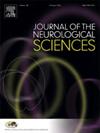Functional cognitive disorder in Alzheimer's disease
IF 3.2
3区 医学
Q1 CLINICAL NEUROLOGY
引用次数: 0
Abstract
Objectives
To conduct a preliminary exploration of functional cognitive disorders (FCD) in the context of Alzheimer's disease (AD), and potential shared mechanisms.
Methods
Retrospective analysis of a convenience sample of FCD patients with an overlapping diagnosis of AD evaluated in two outpatient services in the United Kingdom, between 2010 and 2023. Demographics, latency until AD diagnosis, detailed description of FCD and AD, comorbidities, family history, imaging and fluid biomarkers, cognitive testing, symptom trajectory, and employment status were collected from hospital records. Possible clues for AD among FCD patients were explored by comparing FCD-AD cases against a sample of insidious onset FCD-only patients matched for age at symptom onset.
Results
Twelve FCD-AD cases were identified (eight female). All patients had FCD symptoms before or simultaneously with an AD diagnosis (median latency of 2.5 years). Low cognitive scores at baseline, sleep disturbance and/or mood and anxiety disorders were more common in the FCD-AD cases, in comparison with the FCD-only group. Informants' concern, executive, language and/or praxis difficulties, and an increase in repetitions may point to underlying AD. No cases appeared to be a misdiagnosis. Initial relative symptom stability or transient improvement, stressful life events around symptom onset and a family history of cognitive difficulties did not differentiate between FCD patients with or without AD.
Discussion
FCD may be a prodromal or presenting feature of AD. We discuss potential links between the two, and the clinical relevance of these findings for prognostication and management of FCD patients, including its implications for clinical trials.
阿尔茨海默病的功能性认知障碍
目的对阿尔茨海默病(AD)背景下的功能性认知障碍(FCD)及其可能的共同机制进行初步探讨。方法回顾性分析2010年至2023年间在英国两家门诊评估的重叠诊断为AD的FCD患者的方便样本。从医院记录中收集了人口统计学、诊断前的潜伏期、FCD和AD的详细描述、合并症、家族史、影像学和液体生物标志物、认知测试、症状轨迹和就业状况。通过将FCD-AD病例与症状发病年龄匹配的潜伏性FCD-AD患者样本进行比较,探索FCD患者中AD的可能线索。结果共发现FCD-AD 12例,其中女性8例。所有患者在AD诊断前或同时有FCD症状(中位潜伏期为2.5年)。基线认知评分低、睡眠障碍和/或情绪和焦虑障碍在FCD-AD病例中比仅fcd组更常见。举报人的关注、执行、语言和/或实践困难,以及重复次数的增加可能表明潜在的AD。没有病例被误诊。初始相对症状稳定或短暂改善、症状发作前后的应激生活事件和认知困难家族史并不能区分伴有或不伴有AD的FCD患者。fcd可能是AD的前驱或表现特征。我们讨论了两者之间的潜在联系,以及这些发现对FCD患者预后和管理的临床相关性,包括其对临床试验的影响。
本文章由计算机程序翻译,如有差异,请以英文原文为准。
求助全文
约1分钟内获得全文
求助全文
来源期刊

Journal of the Neurological Sciences
医学-临床神经学
CiteScore
7.60
自引率
2.30%
发文量
313
审稿时长
22 days
期刊介绍:
The Journal of the Neurological Sciences provides a medium for the prompt publication of original articles in neurology and neuroscience from around the world. JNS places special emphasis on articles that: 1) provide guidance to clinicians around the world (Best Practices, Global Neurology); 2) report cutting-edge science related to neurology (Basic and Translational Sciences); 3) educate readers about relevant and practical clinical outcomes in neurology (Outcomes Research); and 4) summarize or editorialize the current state of the literature (Reviews, Commentaries, and Editorials).
JNS accepts most types of manuscripts for consideration including original research papers, short communications, reviews, book reviews, letters to the Editor, opinions and editorials. Topics considered will be from neurology-related fields that are of interest to practicing physicians around the world. Examples include neuromuscular diseases, demyelination, atrophies, dementia, neoplasms, infections, epilepsies, disturbances of consciousness, stroke and cerebral circulation, growth and development, plasticity and intermediary metabolism.
 求助内容:
求助内容: 应助结果提醒方式:
应助结果提醒方式:


